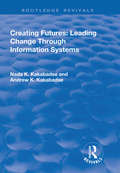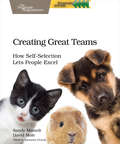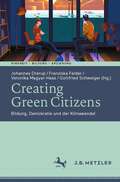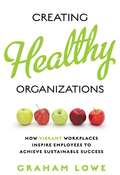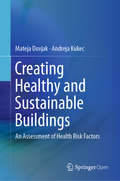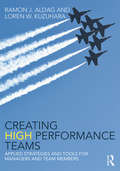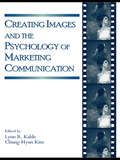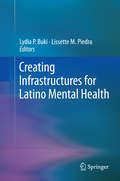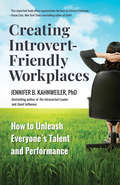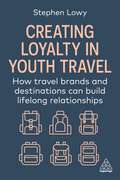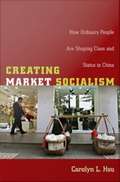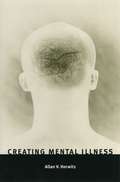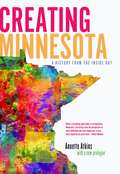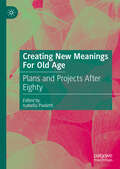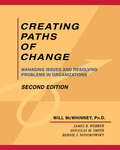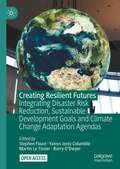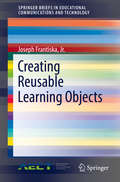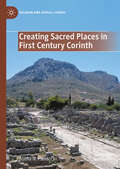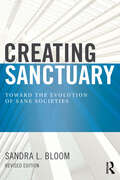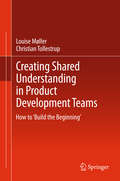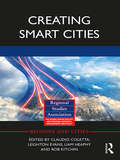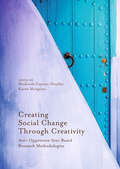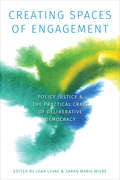- Table View
- List View
Creating Futures: Leading Change Through Information Systems (Routledge Revivals)
by Andrew Dorac-KakabadseThis title was first published in 2000: This volume focuses on the influence of, and additionally explores the value adding contribution of, information systems and related technologies on the development of society and private and public sector enterprises. The chapters are stand-alone units representing the research work and thinking of the Cranfield School of Management. The initial chapters examine the impact of IS/IT on society and organizations. As the book progresses, attention is then given to exploring the effects of IS/IT on individuals within the information arena and more broadly within varying walks of life.
Creating Great Teams: How Self-Selection Lets People Excel
by Sandy Mamoli David MolePeople are happiest and most productive if they can choose what they work on and who they work with. Self-selecting teams give people that choice. Build well-designed and efficient teams to get the most out of your organization, with step-by-step instructions on how to set up teams quickly and efficiently. You'll create a process that works for you, whether you need to form teams from scratch, improve the design of existing teams, or are on the verge of a big team re-shuffle. Discover how New Zealand's biggest e-commerce company completely restructured their business through Self-Selection. In the process, find out how to create high-performing groups by letting people self-organize into small, cross-functional teams. Step-by-step guides, easy-to-follow diagrams, practical examples, checklists, and tools will enable you to run a Self-Selection process within your organization.If you're a manager who wants to structure your organization into small teams, you'll discover why Self-Selection is the fastest and safest way to do so. You'll prepare for and organize a Self-Selection event and make sure your Self-Selection participants and fellow managers are on board and ready. If you're a team member, you'll discover what it feels like to be part of a Self-Selection process and what the consequences are for your daily work. You'll learn how to influence your colleagues and bosses to be open to the idea of Self-Selection. You'll provide your manager with a plan for how to facilitate a Self-Selection event, and with evidence that the system works.If you're feeling the pain and chaos of adding new people to your organization, or just want to ensure that your teams have the right people with the right skills, Self-Selection will help you create the effective teams you need.
Creating Green Citizens: Bildung, Demokratie und der Klimawandel (Kindheit – Bildung – Erziehung. Philosophische Perspektiven)
by Franziska Felder Johannes Drerup Gottfried Schweiger Veronika Magyar-HaasDer Zusammenhang zwischen liberaler Demokratie als Staats- und Lebensform, politischer und ökologischer Bildung und einer angemessenen Einrichtung und Neuausrichtung menschlicher Naturverhältnisse im Lichte des Klimawandels ist nicht zuletzt auf Grund der Bewegung „Fridays for Future“ ein Thema, das in der aktuellen öffentlichen Selbstverständigung dauerpräsent ist. Zugleich ist dieser Konnex mit Grundsatzfragen verbunden, die das Selbstverständnis liberaler Demokratien und ihrer Erziehungs- und Bildungssysteme in ihrem normativen Kern betreffen. In dem Band werden unterschiedliche miteinander verschränkte Problemdimensionen des Zusammenhangs zwischen Bildung, Demokratie und Klimawandel theoretisch und empirisch rekonstruiert, analysiert und diskutiert.
Creating Healthy Organizations
by Graham LoweThe current global economic environment is defined by unprecedented uncertainty, a premium placed on knowledge, and the threat of future talent scarcity. Key to an organization's success under these conditions is its ability to strengthen the links between people and performance. Creating Healthy Organizations provides executives, managers, human resource professionals, and employees an action-oriented approach to forging these connections by creating and sustaining vibrant and productive workplaces.A healthy organization operates in ways that benefits all stakeholders, including employees, customers, shareholders, and communities. Using a wide range of examples from a variety of internationally based industries, Graham Lowe integrates leading practices with research on workplace health and wellness, quality work environments, employee engagement, organizational performance, and corporate social responsibility to make a compelling business case for creating healthy, resilient, and sustainable organizations.Creating Healthy Organizations offers readers, whether CEOs or front-line workers, an innovative framework and practical tools for planning, implementing, and measuring healthy change in their workplaces.
Creating Healthy and Sustainable Buildings: An Assessment of Health Risk Factors
by Mateja Dovjak Andreja KukecThe open access book discusses human health and wellbeing within the context of built environments. It provides a comprehensive overview of relevant sources of literature and user complaints that clearly demonstrate the consequences of lack of attention to health in current building design and planning. Current designing of energy-efficient buildings is mainly focused on looking at energy problems and not on addressing health. Therefore, even green buildings that place environmental aspects above health issues can be uncomfortable and unhealthy, and can lead to public health problems. The authors identify many health risk factors and their parameters, and the interactions among risk factors and building design elements. They point to the need for public health specialists, engineers and planners to come together and review built environments for human wellbeing and environmental sustainability. The authors therefore present a tool for holistic decision-making processes, leading to short- and long-term benefits for people and their environment.
Creating High Performance Teams: Applied Strategies and Tools for Managers and Team Members
by Ray Aldag Loren KuzuharaCreating High Performance Teams is an accessible and thorough new introduction to this key area of business education. Written by teams experts Ray Aldag and Loren Kuzuhara, this book provides students with both a firm grounding in the key concepts of the field and the practical tools to become successful team managers and members. Built on a solid foundation of the most up to date research and theory, chapters are packed with case studies, real-world examples, tasks and discussion questions, while a companion website supports the book with a wealth of useful resources for students, team members, and instructors. Centered around an original model for high performance teams, topics covered include: Building and developing effective teams Managing diversity Effective communication Team processes – meetings, performance management Dealing with change and team problems Current issues – virtual teams, globalization With its combined emphasis on principles and application, interwoven with the tools, topics, and teams most relevant today, Creating High Performance Teams is perfectly placed to equip upper-level undergraduate and MBA students with the knowledge and skills necessary to take on teams in any situation.
Creating Images and the Psychology of Marketing Communication
by Lynn R. Kahle Chung-Hyun KimThe purpose of Creating Images and the Psychology of Marketing Communication is to advance the understanding of the concept of image as it is applied to various areas of interest. It also serves to meet the growing interest in image-related studies by the public and academics, and provides an innovative and holistic approach to the study of image. The text reflects the importance of brand leveraging as the sections cover in-depth discussion on cross-country and tourism images, corporate and sponsorship images, individual and celebrity images, and cultural and social images. It provides a comprehensive and holistic look at the concept of image: the topics range from theories of image creative to other image studies on a country, corporate, and individual level. The sections cover the major topics currently being debated in image marketing and the psychology of communications. Several new and innovative concepts are also introduced in the book.Creating Images and the Psychology of Marketing Communication is intended for academics and scholars (including students) in the interdisciplinary fields of consumer psychology, marketing, and communication.
Creating Infrastructures for Latino Mental Health
by Lydia P. Buki Lissette M PiedraLatinos are the fastest growing and largest minority group in the United States. In 2008, this group numbered over 47 million; by 2050, the population is expected to triple, reaching 133 million. Traditionally, Latinos have immigrated to large urban centers (e.g., New York, Los Angeles) that over long periods of time developed a complex infrastructure to receive new immigrants. Increasingly, new Spanish-speaking immigrants are moving into areas of the country previously unfamiliar to them. Although urban co-ethnic communities continue to be the destination of many newcomers, immigrants from Mexico, Central America, and South America in pursuit of low-skilled labor opportunities are settling in small towns and rural areas of the South and Midwest. This new demographic trend has resulted in the creation of the term "new growth communities," which refers to small rural areas that are now home to a small but rapidly growing Hispanic population. Unfortunately, these communities, which are now present in many states across the country (e.g., Illinois, North Carolina), lack the infrastructure necessary to meet the needs of Latino immigrants (e.g., access to health care, immigration assistance, and breaking down language barriers). The lack of an infrastructure and the lack of an established ethnic community to facilitate the assimilation of new immigrants present an ongoing challenge, especially in the area of Latino mental health. The volume focuses on dealing with systemic issues and on providing innovative ideas for development of infrastructure of services. This text will advance ways to understand and ameliorate mental health disparities both from research and experiential perspectives.
Creating Introvert-Friendly Workplaces: How to Unleash Everyone’s Talent and Performance
by Jennifer Kahnweiler"This important book offers organizations the keys to introvert inclusion."—Susan Cain, New York Times bestselling author of Quiet InfluenceThe first guide to creating a welcoming culture that maximizes the powerful contributions introverts bring to the workplace.As the diversity, equity, and inclusion wave widens and deepens its reach, introversion is becoming a natural part of that movement. After all, about half the population identify as introverts, but many organizations are stuck in traditional extrovert-centric workplace cultures that reward people for speaking up publicly, expect them to log face time, and employ hiring and promotion practices rooted in the past. This ultimately discourages introverts from contributing and reaching their full talent potential, which could have a major impact on the bottom line."Champion for introverts" Jennifer Kahnweiler offers a road map for everyone in the workplace--including leaders, human resource managers, and team members--to create inclusive, introvert-friendly cultures. Kahnweiler provides an assessment to determine how introvert friendly your organization is and looks at every aspect of organizational life--hiring, training, leading, communicating, meeting, designing workplaces, and more--through an inclusive lens. You'll discover how to make open-space offices introvert friendly, what the best practices are for encouraging introverts to participate on teams, which training techniques work best for introverts, and how to make remote positions work.
Creating Loyalty in Youth Travel: How Travel Brands and Destinations Can Build Lifelong Relationships
by Stephen LowyBy attracting young people, travel brands and destinations can create a lifetime of value, with young people often staying longer, spreading their spend across a destination, contributing to the local economy and returning again and again. Creating Loyalty in Youth Travel explores the varying and unique needs of young tourists - from backpackers to youth mobility workers - and the challenges brands and destinations face in attracting and retaining them. While travel professionals often target certain sectors such as business or luxury travellers, this can be a short-sighted strategy. Youth travellers can be a more sustainable market as they frequently form an emotional tie to a destination or travel brand, driving them to return throughout their lives, sharing with family and friends and increasing their spend as they age. This book looks at how successful brands and destinations prioritize developing long-term relationships with travellers early on, so that they can continue to cater to loyal customers throughout their lives with different offerings from within the same brand. Some countries and travel brands excel at this, building it into the heart of their strategy, while others have ignored this key market to their own detriment. Through extended interviews from leaders in the sector such as Marriott and Tourism Australia, this book helps tourism and hospitality professionals to understand the needs of the youth traveler market and harness the potential of it to build a long-term strategy for the tourism industry.
Creating Market Socialism: How Ordinary People are Shaping Class and Status in China
by Carolyn L. HsuIn the midst of China's post-Mao market reforms, the old status hierarchy is collapsing. Who will determine what will take its place? In Creating Market Socialism, the sociologist Carolyn L. Hsu demonstrates the central role of ordinary people--rather than state or market elites--in creating new institutions for determining status in China. Hsu explores the emerging hierarchy, which is based on the concept of suzhi, or quality. In suzhi ideology, human capital and educational credentials are the most important measures of status and class position. Hsu reveals how, through their words and actions, ordinary citizens decide what jobs or roles within society mark individuals with suzhi, designating them "quality people. " Hsu's ethnographic research, conducted in the city of Harbin in northwestern China, included participant observation at twenty workplaces and interviews with working adults from a range of professions. By analyzing the shared stories about status and class, jobs and careers, and aspirations and hopes that circulate among Harbiners from all walks of life, Hsu reveals the logic underlying the emerging stratification system. In the post-socialist era, Harbiners must confront a fast-changing and bewildering institutional landscape. Their collective narratives serve to create meaning and order in the midst of this confusion. Harbiners collectively agree that "intellectuals" (scientists, educators, and professionals) are the most respected within the new social order, because they contribute the most to Chinese society, whether that contribution is understood in terms of traditional morality, socialist service, or technological and economic progress. Harbiners understand human capital as an accurate measure of a person's status. Their collective narratives about suzhi shape their career choices, judgments, and child-rearing practices, and therefore the new practices and institutions developing in post-socialist China.
Creating Mental Illness
by Allan V. HorwitzIn this surprising book, Allan V. Horwitz argues that our current conceptions of mental illness as a disease fit only a small number of serious psychological conditions and that most conditions currently regarded as mental illness are cultural constructions, normal reactions to stressful social circumstances, or simply forms of deviant behavior.
Creating Minnesota: A History From The Inside Out
by Annette AtkinsRenowned historian Annette Atkins presents a fresh understanding of how a complex and modern Minnesota came into being in Creating Minnesota. Each chapter of this innovative state history focuses on a telling detail, a revealing incident, or a meaningful issue that illuminates a larger event, social trends, or politics during a period in our past. A three-act play about Minnesota's statehood vividly depicts the competing interests of Natives, traders, and politicians who lived in the same territory but moved in different worlds. Oranges are the focal point of a chapter about railroads and transportation: how did a St. Paul family manage to celebrate their 1898 Christmas with fruit that grew no closer that 1,500 miles from their home? A photo essay brings to life three communities of the 1920s, seen through the lenses of local and itinerant photographers. The much-sought state fish helps to explain the new Minnesota, where pan-fried walleye and walleye quesadillas coexist on the same north woods menu. In Creating Minnesota Atkins invites readers to experience the texture of people's lives through the decades, offering a fascinating and unparalleled approach to the history of our state.
Creating New Meanings For Old Age: Plans and Projects After Eighty
by Isabella PaolettiThis edited volume proposes a radical change in perspective, fighting the prevalent ageist culture that tends to relegate the oldest old to isolation and irrelevance. The chapters show that having plans and projects, being involved in life, is possible for those aged 80 and over, as well as for oldest old people with disabilities. Exploring the involvement of oldest old people in various activities that make them feel happy, worthy, and connected, this volume builds on a large empirical literature documenting that a sense of purpose in life is associated with delayed mortality and reduced health risks. In doing so, this book aims to combat widespread ageist attitudes at an interactional and institutional level, and shift the focus from loss and decay to adaptability, involvement, inner strength, and resilience. It illuminates how oldest old people are inventing new meanings for ageing.
Creating Paths of Change: Managing Issues and Resolving Problems in Organizations
by Dr Will McWhinney Dr James B. Webber Dr Douglas M. Smith Dr Bernie J. NovokowskyIndividuals, organizations and communities constantly engage in change. Creating Paths of Change provides the reader with a proven strategy for making changes and resolving issues more effectively. The book: addresses the problems faced in the daily operations of organizational life; provides a foundation and theory for effective and sustained issue resolution; and guides readers step-by-step through the change-making or decision-making process, enabling them to identify their personal problem-solving approach.
Creating Positive Systems of Child and Family Welfare
by Marshall Fine Karen Frensch Gary Cameron Sarah Maiter Nancy FreymondThe North American approach to child protection is broadly accepted, despite frequent criticisms of its core limitations: parental fear and resistance, the limited range of services and supports available to families, escalating costs, and high stress and turnover among service providers. Could these shortcomings be improved through organizational or system reform?Based on findings from a decade's worth of research, Creating Positive Systems of Child and Family Welfare provides original reflections on the everyday realities of families and front-line service providers involved with the system. It includes data from a variety of regions and situations, all linked together through a common investigatory framework. The contributors highlight areas of concern in current approaches to child and family welfare, but also propose new solutions that would make the system more welcoming and helpful both for families and for service providers.
Creating Resilient Futures: Integrating Disaster Risk Reduction, Sustainable Development Goals and Climate Change Adaptation Agendas
by Stephen Flood Yairen Jerez Columbié Martin Le Tissier Barry O’DwyerThis open access edited volume critically examines a coherence building opportunity between Climate Change Adaptation, the Sustainable Development Goals and Disaster Risk Reduction agendas through presenting best practice approaches, and supporting Irish and international case studies. The Covid-19 pandemic has highlighted existing global inequalities and demonstrated the scope and scale of cascading socio-ecological impacts. The impacts of climate change on our global communities will likely dwarf the disruption brought on by the pandemic, and moreover, these impacts will be more diffuse and pervasive over a longer timeframe. This edited volume considers opportunities to address global challenges in the context of developing resilience as an integrated development continuum instead of through independent and siloed agendas.
Creating Reusable Learning Objects (SpringerBriefs in Educational Communications and Technology)
by Joseph FrantiskaThisbrief examines and explores the reuse of learning objects to enhance students' learning experiences. The author details the difficulties of reusing learning objects, or the Reusability Paradox, and how to create more flexible learning objects. The brief also proposes a methodology to minimize limitations and therefore maximize a learning object's utility across a number of fields.
Creating Sacred Places in First Century Corinth (Religion and Spatial Studies)
by Alisha N. PaddockThis book applies spatial theories from human and cultural geography to the archaeological remains of Ancient Corinth in order to consider how sacred places could have been created in the first century. Building on Philip Sheldrake's theory, among others, the book defines sacred place as a space with significance. Significance is found in the group&’s spiritual history, their identity, and the proper behaviours required to keep the group remaining a group. The book further argues that if any of these elements of place are not recognized nor upheld, the group risks becoming placeless.
Creating Sanctuary: Toward the Evolution of Sane Societies, Revised Edition
by Sandra L BloomCreating Sanctuary is a description of a hospital-based program to treat adults who had been abused as children and the revolutionary knowledge about trauma and adversity that the program was based upon. This book focuses on the biological, psychological, and social aspects of trauma. Fifteen years later, Dr. Sandra Bloom has updated this classic work to include the groundbreaking Adverse Childhood Experiences Study that came out in 1998, information about Epigenetics, and new material about what we know about the brain and violence. This book is for courses in counseling, social work, and clinical psychology on mental health, trauma, and trauma theory.
Creating Shared Understanding in Product Development Teams: How to ‘Build the Beginning’
by Louise Møller Christian TollestrupDevelopment projects that span different disciplines and groups often face problems in establishing a shared understanding of the project's purpose, deliverables, and direction. Creating Shared Understanding in Product Development Teams: How to 'Build the Beginning' uses research-based cases from TC Electronic, The Red Cross, Daimler AG, and Copenhagen Living Lab to demonstrate one approach to this problem complex. It shows how prototyping specific physical artifacts can function as drivers and focal points for creating the much needed shared understanding. Encompassing both the participant's and the facilitator's point of view, Creating Shared Understanding in Product Development Teams: How to 'Build the Beginning' provides both practical examples and theoretical explanation for the process of creating shared understanding. This book provides a toolbox and a practical guide for planning, executing, and facilitating workshops. The result is a clear outline of how to facilitate the creation of physical artifacts that enables and stimulates communication between team members, users, and stakeholders in order to create shared understanding of projects
Creating Smart Cities (Regions and Cities)
by Rob Kitchin Leighton Evans Claudio Coletta Liam HeaphyIn cities around the world, digital technologies are utilized to manage city services and infrastructures, to govern urban life, to solve urban issues and to drive local and regional economies. While "smart city" advocates are keen to promote the benefits of smart urbanism – increased efficiency, sustainability, resilience, competitiveness, safety and security – critics point to the negative effects, such as the production of technocratic governance, the corporatization of urban services, technological lock-ins, privacy harms and vulnerability to cyberattack. This book, through a range of international case studies, suggests social, political and practical interventions that would enable more equitable and just smart cities, reaping the benefits of smart city initiatives while minimizing some of their perils. Included are case studies from Ireland, the United States of America, Colombia, the Netherlands, Singapore, India and the United Kingdom. These chapters discuss a range of issues including political economy, citizenship, standards, testbedding, urban regeneration, ethics, surveillance, privacy and cybersecurity. This book will be of interest to urban policymakers, as well as researchers in Regional Studies and Urban Planning.
Creating Social Change Through Creativity: Anti-Oppressive Arts-Based Research Methodologies
by Moshoula Capous-Desyllas Karen MorgaineThis book examines research using anti-oppressive, arts-based methods to promote social change in oppressed and marginalized communities. The contributors discuss literary techniques, performance, visual art, and new media in relation to the co-construction of knowledge and positionality, reflexivity, data representation, community building and engagement, and pedagogy. The contributors to this volume hail from a wide array of disciplines, including sociology, social work, community psychology, anthropology, performing arts, education, medicine, and public health.
Creating Sociological Awareness: Collective Images and Symbolic Representations
by Anselm L. StraussThis volume of papers from the distinguished sociologist Anselm Strauss reflects his self-professed lifelong intention to create sociological awareness in his readers and students. As Irving Louis Horowitz notes in his foreword to the book, at the center of Strauss's effort has been the democratization of sociology. He has achieved this goal by making sure that relativities of status, power, and wealth are acknowledged in the conduct of everyday life, and by recognition that all collective life is subject to negotiation, rearrangement and reconstruction. Represented here is some of the work for which Strauss is best known, and the principal themes that have captured his imagination throughout his productive career. These include work, leisure, culture, illness, identity, and policy. All are linked by Strauss's "web of negotiation" by which organizational arrangements can be changed. The volume concludes with a selection of his work in problems of method, consultation, and teaching, affirming Strauss's commitment to passing along the sociological awareness reflected in this volume to a next generation. Squarely in the long tradition of the Chicago School of sociology, the work of Anselm Strauss represents the very best thinking in modem sociological and psychological analysis. Those interested in the development of his major conceptual frameworks, as well as those interested in the development of the specific subject areas to which Anselm Strauss has devoted his career will find this an essential volume. Professionals in the history of sociology, the sociology of knowledge, or medical sociology will find the book of particular interest.
Creating Spaces of Engagement: Policy Justice and the Practical Craft of Deliberative Democracy
by Sarah Marie Wiebe Leah R.E. LevacThere is a growing need for public buy-in if democratic processes are to run smoothly. But who exactly is "the public"? What does their engagement in policy-making processes look like? How can our understanding of "the public" be expanded to include – or be led by – diverse voices and experiences, particularly of those who have been historically marginalized? And what does this expansion mean not only for public policies and their development, but for how we teach policy? Drawing upon public engagement case studies, sites of inquiry, and vignettes, this volume raises and responds to these and other questions while advancing policy justice as a framework for public engagement and public policy. Stretching the boundaries of deliberative democracy in theory and practice, Creating Spaces of Engagement offers critical reflections on how diverse publics are engaged in policy processes.
